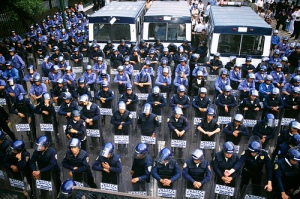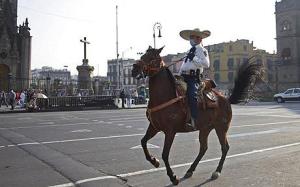Not every cop is a criminal…
What you read about in the foreign press (and the Mexican press) right now is about police officers being arrested en masse… but what you aren’t hearing about are replacements.
I caught this small item in the Caracas English-language Latin American Herald Tribune (rapidly becoming one of my favorite newspapers):
The Mexican government has launched a program to train 1,500 university graduates as federal police investigators and intelligence officers as part of an effort to upgrade law enforcement by introducing scientific methods.
“It gives me great pleasure to know that there are men and women trained at the country’s best universities who are willing to be investigative and intelligence police officers for the Federal Police,” President Felipe Calderon told the trainees in a videotaped message on Monday.
…
The 12-week program will be held at four universities and police academies, with Mexican university professors and foreign instructors teaching the courses.
Trainees will acquire knowledge and skills in a number of areas, such as anthropology, psychology and criminal sociology, learning about criminal behavior.
They will also learn, among other subjects, about police theory and ethics, police techniques, and basic principles of police analysis and investigation, while observing human rights and complying with the law.
While I wonder if a 12-week training course is sufficient, this is a step in the right direction. The biggest problem (two problems, actually) with police in Mexico is that they are poorly trained and poorly paid… which either results in — or is a reflection of — the perception of police officers as a low-status occupation.
I’ve been accused (and plead no-contest) to not accepting the common (journalistic) formula that Lopez Obrador is or was a dangerous radical. I lived in the Federal District during his tenue as Jefe de Gobierno, and thought the district ran relatively well… and that improvements in the quality of life were noticeable. It wasn’t the big splashy programs that I thought made him more than “presidentiable” but the bureaucratic and policy changes that really affected day-to-day life: street lights and garbage collection issues.
 I was particularly impressed (and mentioned it in passing in my Mexican history, seeing it as a major historical change) with the police reforms instituted when now Jefe, Marcelo Ebrard was Secretary of Public Safety (“police commissioner”). Higher educational requirements for police candidates might not mean less muggings today, but it meant smarter cops on the streets over the next several years. Better salaries and more benefits didn’t eliminate bribery, but it makes the job more attractive to people with a “respectable” lifestyle, and didn’t need to risk their jobs for a few pesos to get through the day.
I was particularly impressed (and mentioned it in passing in my Mexican history, seeing it as a major historical change) with the police reforms instituted when now Jefe, Marcelo Ebrard was Secretary of Public Safety (“police commissioner”). Higher educational requirements for police candidates might not mean less muggings today, but it meant smarter cops on the streets over the next several years. Better salaries and more benefits didn’t eliminate bribery, but it makes the job more attractive to people with a “respectable” lifestyle, and didn’t need to risk their jobs for a few pesos to get through the day.
Both Lopez Obrador and Ebrard came to their political careers from the social services field. It seems laughable when the administration began fiddling with police uniforms, and that seems like a small thing, but image is important.
Ned Crouch’s well-written (and MexFiles recommended) book for U.S. employers doing business in Mexico, “Mexicans & Americans: Cracking the Culture Code” recommends exploiting the Mexican sense of group identity in the workplace. While the job itself may not be glamourous, or even particularly high status, giving the workers a sense of themselves as part of a group and showing respect for them as members of that group, pays off.

Still there are budget problems. Officer Dobbin didn't get a cubraboca.
One example Crouch uses is giving “gimme-hats” to the employees, including the grounds keepers. It wasn’t the hats that were important to the guys mowing the lawns around the office… it was being seen as having a place within the group’s overall solidarity. Similary with police uniforms — it wasn’t so much that a cop now had something that looked sharp and flattered his or her build (though, there’s the side effect that when you look good, you are a lot less likely to hang around with taco grease down the front of your jacket… or indulge in enough tacos to ruin the good silhouette. “Cos every girl crazy bout a sharp dressed man“, new uniforms may have been a factor in being able to recuit younger, healthier, cadets.
 And, a part of that esprit de corps (and another improvement in overall police work) was also a simple change unlikely to make a splash at election time… calisthenics at the start of the shift, and more physical education (even for the Segway patrols) and weight training for the cops.
And, a part of that esprit de corps (and another improvement in overall police work) was also a simple change unlikely to make a splash at election time… calisthenics at the start of the shift, and more physical education (even for the Segway patrols) and weight training for the cops.
Uniforms and equipment only go so far… Delegacion Miguel Hidalgo a few years ago spent a fortune on outfitting “robo-cops”… who, with no training, were sent out to squelch unlicensed vendors and got the crap beat out of them by a bunch of irate grannies. Training takes time, and doesn’t fit election cycles, but is absolutely necessary. Ebrard’s biggest single reform was instituting on-going training sessions for the police, and I’ve written before on the amazing training program in Nezahuacoatl that radically altered citizen perceptions of the police. It’s not just using weapons, but just basic citizenship that makes for better policemen. It may not get votes this cycle, but it pays off in the long run.
Of course, there are still problems with policing in Mexico City — and the police are far from ideal. you are always going to have your share of bullies and perverts and uniform fetishists in a job like this, but I’d say the Federal District police are — overall — much better than those you find in most places throughout the country or anywhere in Latin America. When you read about corrupt officers in Mexico City, you usually find that the persons involved were Delegacion or Auxillary officers, not members of one of the Federal District units, or were members of the same unit (in which case, it’s usually their commander who is at fault).
I question the timing of the newest wave of police and bureaucratic arrests (and wonder whether they’ll even come to court, or the cases will be quietly dropped after the July elections), but firing a bunch of ill-paid, uneducated, bribable cops doesn’t resolve the problem. It might sway a few voters (or.. perhaps, PAN often following the U.S. Republican Party’s tactics, discouraging poorer voters — who tend to vote for the other parties — from going to the polls). Nor, is it just a matter of equipment. The only thing worse than a sleazy cop, is a well-armed sleazy cop.
Not glamorous, and not likely to make much money for U.S. “advisors and consultants”, but the real way to get a handle on Mexican police problems (if they are, indeed, problems) is uniforms, pay and training. Not highly politicized short-term headline making “house-cleanings”.






Many of the reforms you mentioned are very reminiscent of Prof. Deming. I was always amused by the fact that the Japanese embraced him, while US auto companies laughed at much of his approach.